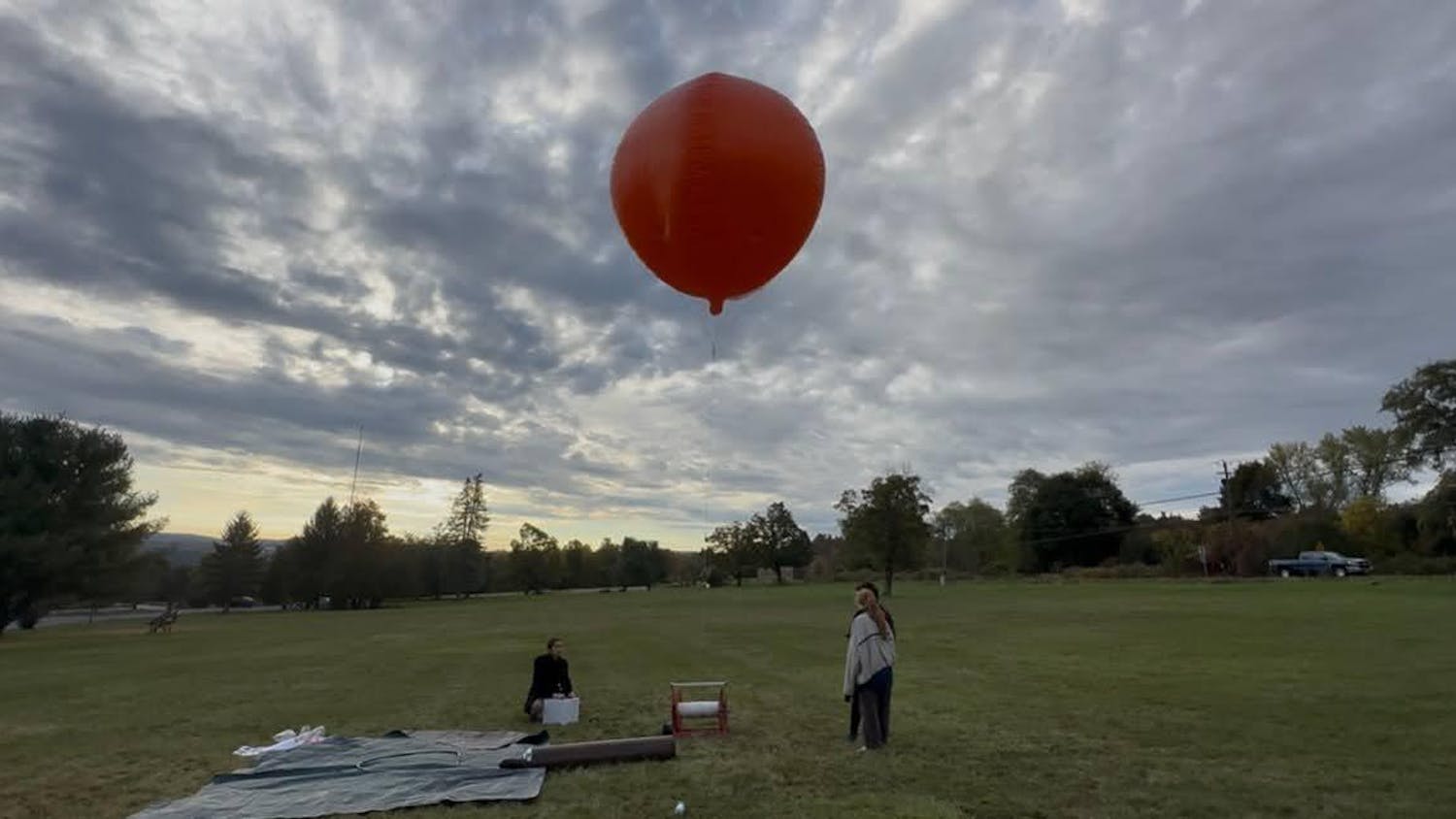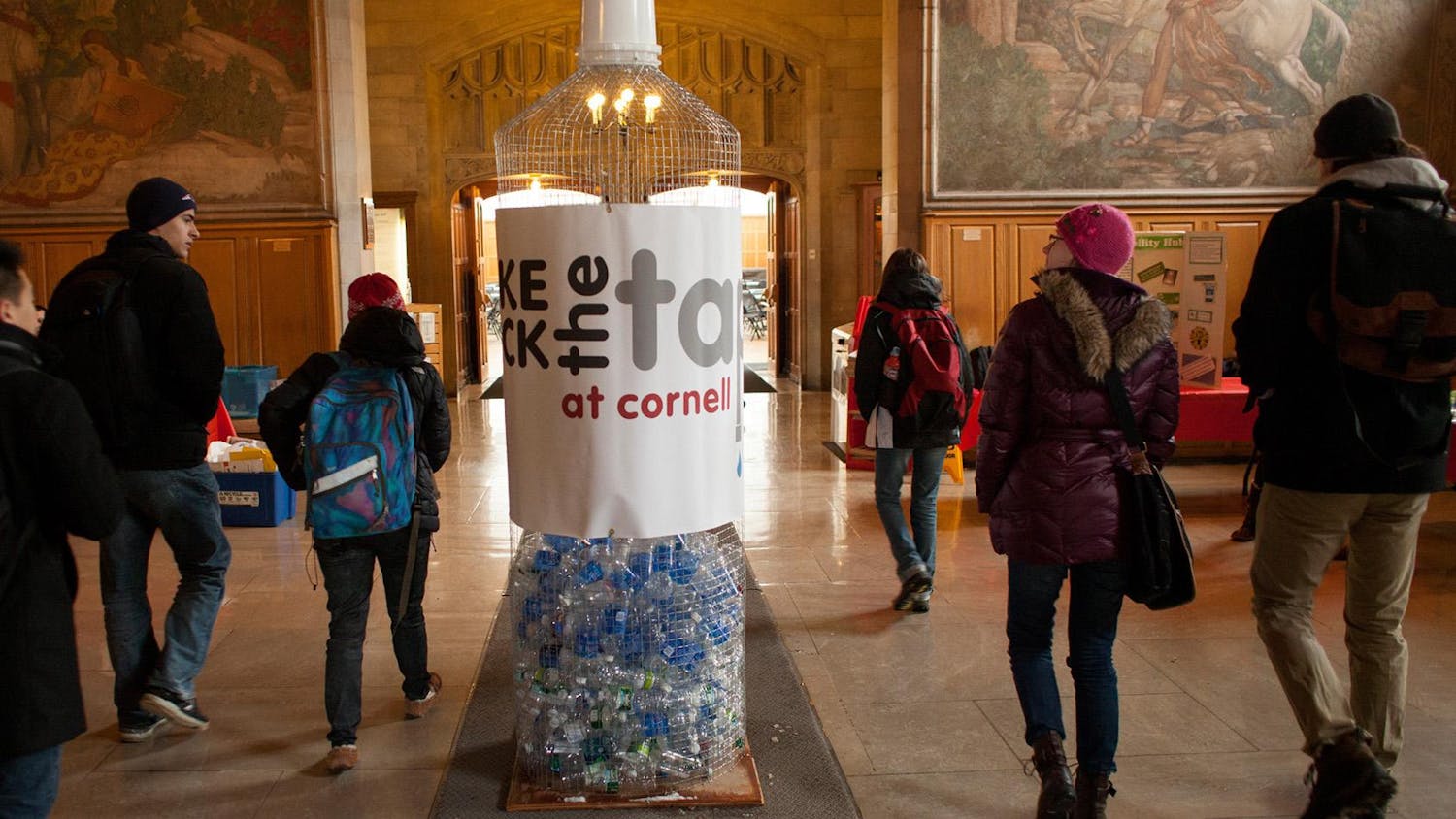Swerving between lanes. Pushing up and down crowded aisles.
It's not New York City rush hour, but the first week of the semester at The Cornell Store.
With competing prices and selection, the newly opened Borders and the soon to arrive Barnes & Noble may create competition for The Cornell Store.
Borders opened this summer in Pyramid Mall in Lansing next to newcomers Best Buy and Dick's Sporting Goods. Barnes and Noble is expected to occupy space on Route 13 in mid-November.
Competitive Edge
Edward Kim '04 said he has encountered difficulties buying books from The Cornell Store.
"I'm usually late getting back on campus from breaks and all the books I need are gone already," Kim said.
Since The Cornell Store factors into account the number of students who will drop a class and the number of students who will not purchase their textbooks from the campus store, the store does not stock enough books to meet the demand for certain materials, representatives said.
If back orders are needed, materials usually take about a week to arrive depending on the publisher, according to Thomas W. Romantic, director of Cornell Business Services. The campus store has little control over how long it takes the publisher to send second shipments.
Some students who have waited several weeks for a text to arrive have found that ordering books online from textbook services such as ecampus.com or bn.com may be a faster and more convenient alternative.
The opening of two large booksellers near Cornell offers students another option for buying course materials.
Though the Cornell Store is located at the heart of the campus, if students have a list of the books they need (students can access their course booklist through The Cornell Store's website), they can shop for course materials at Barnes & Noble or Borders. With the frustrations many students may feel about shopping at The Cornell Store, this could save students money and the trouble of having to navigate through crowded isles, waiting in line and avoiding falling books.
Local retailers may also be of assistance to students looking to special-order textbooks that are on back order at The Cornell Store. The Rapid Special Order Services available at the new Barnes & Noble store can alleviate the textbook "rush hour," according to Barnes & Noble spokesperson David Kyuryk, who said that the service offers over a million titles with fast delivery.
The larger corporations are also able to provide a variety of discounts for people who need to buy a large quantity of books. "Last semester I spent about $500 on textbooks," said Neal R. Miniyar '04.
For students who spend from $200 to $600 on textbooks each semester, both Borders and Barnes & Noble offers membership programs that can cushion the costly prices of textbooks.
According to Kyuryk, the Reader's Advantage Program can save students a lot of money each semester. After the initial $25 cost for membership, members of Reader's Advantage can take an additional 10 percent off everything they buy, however, Romantic stated that neither Barnes & Noble nor Borders specifically cater to college students' needs.
Though Barnes & Noble and Borders may be a convenient place to pick up a novel for an English class or a trade title, Romantic mentions that "one of the first issues to clarify is that neither Barnes & Noble or Borders are really in the textbook business."
Managers and spokespersons commented on their markets.
According to Kyuryk, "[Barnes & Noble does not] have plans to sell textbooks," who also said that Barnes and Noble is a private company and does not intend to stock books specifically for Cornell courses. Pyramid Mall Borders' manager Rebecca Elliot said that the college textbook industry has "a lock on textbooks and Borders does not specifically carry textbooks."
Romantic commented on the availability of books through other sources other than The Cornell Store.
"Although both [Barnes & Noble and Borders] sell textbooks through their websites, the research we did last fall indicated that less than 30 percent of the required titles for all large enrollment classes were available there," according to Romantic. "Of the 30 percent that are carried our prices are at or lower on 66 percent of them."
Romantic also said that the discounts students may receive from using other book retailers are minimal.
"Though online textbook sellers offer discounts on high volume titles, the savings are within pennies of what the campus store charges," Romantic said.
"The titles [Barnes & Noble and Borders] choose to discount are small ... the titles they choose to discount are those that are generally used in introductory level courses and the faculty at Cornell tend to use more obscure or custom books."
Last semester, Miniyar, who tried buying his textbooks both online and at the Cornell Store found that it was hard to keep track of his materials.
"It took more than a week for the book I ordered online to arrive, and I considered just going to the campus store to buy a copy and then return the book I ordered," he said.
According to Romantic, convenience has a price too.
"The convenience of one-stop shopping will outweigh the dollar or two [students] will save by shopping at several locations in order to find everything they need," he said.
Differences
Though the large booksellers may carry some of the titles that Cornell students require for their courses, The Cornell Store provides services that cater specifically to the Cornell student.
"I like how I can find everything I need at the campus store. It's easy and convenient," Kim said.
Students can find personal updated booklists in the "integrated book lookup system" at kiosks located throughout the store.
Used book availability, a book buyback program and a return policy that coincides with semester add and drop dates make the campus store the convenient one-stop place for many students to get all the materials for courses.
Additionally, The Cornell Store does not charge the eight percent sales tax that booksellers such as Barnes & Noble and Borders add to their purchases.
In order to get reimbursed for their purchases outside The Cornell Store, students would have to file paperwork with the tax department, according to Romantic.
Convenience
There's no question that students can find certain trade texts at Barnes & Noble and Borders, but "then there's the issue of returns ... approximately 25 percent of the courses at Cornell have some sort of change in syllabus after registration. Do students really want to run all over town (and the Internet) trying to return the books they no longer need and then again find the books that were just added?" Romantic said.
Archived article by Janet Liao










